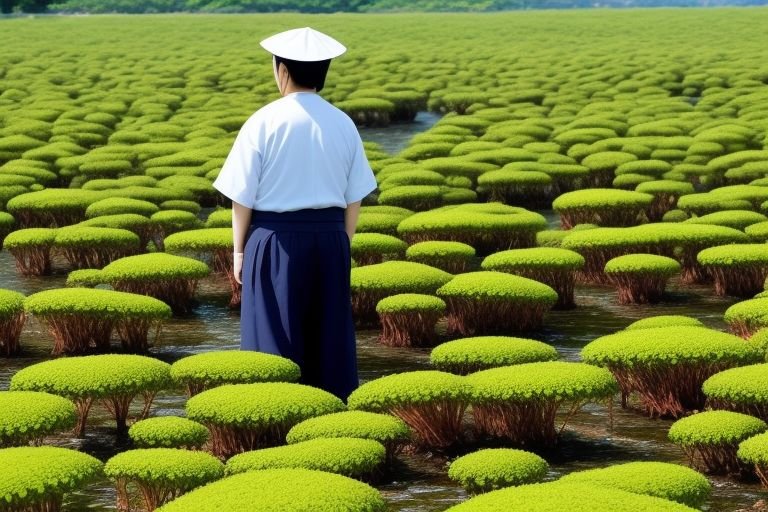
Japanese Researchers Discover Potential Anti-Aging Compound In Seaweed
The new research to be published today by the Kyoto University scientists has revealed unique anti-aging agent in a type of seaweed found in Japan. This has cause excitement in the scientific world it and holds potential for new treatments for diseases associated with ageing as well as laying down clues for healthy ageing.
The chemical was christened ‘algaetin’ and was extracted from Sargassum fusiforme, the hijiki ; a sea vegetable which has formed part of Japan’s diet for centuries. Lead researcher Dr. Yuki Nakamura and her researchers learned laboratory experiments that algaetin stimulates a cellular process that promotes both longevity and stress tolerance.
Some of the pioneer experiments, which involved the effects of algaetin on human cells in a petri dish, showed that algaetin could enhance the efficiency of cells, as well as decrease the number of aging biomarkers. It seemed to maximize the cells’ ability to clean up toxic proteins and orgnanelles through autophagy, which is a fundamental process for cell health that is sometimes defective in aging and age-associated diseases.
Even more encouraging were the findings that came out of work done on animals. When used on mice Algaetin increased the average life expectancy to 12 % and maximum life span to 18 %. We also determined that the treated mice exhibited enhanced cognitive function and muscle strength and exercised better metabolic health compared with age-matched vehicle-treated controls.
Dr. Nakamura explained the significance of the findings: Quite notable about algaetin is that it appeared to reverse five aspects of aging at once, as proposed in the ‘MitoSENS and Morgellons disease ‘ treatment approach. But it is to some extent extending not just the lifespan of individuals but the quality of life in their senior years. This is referred to as ‘healthspan’ extension, which is the objective of all anti-aging research.”
The revelation of algaetin’s possibility has impacts which go beyond the range of simple science. Since Japan is on the verge of a super-aged society, any substance that promises to support health and mobility among older users is a potential hit. The Japanese government has already shown desire in expanding on more researches and development of algaetin based drugs.
But, professionals state that there is still a lot of work to be done in order to bring algaetin to the human market. Dr. In response, gerontologist Hiroshi Tanaka, who did not participate in the study, said: “These are encouraging discoveries; however, for algaetin efficacy among people, we cannot wait anymore for human clinical trials results.”
Currently, the group of researchers is planning a pilot human testing to determine the effects of algaetin on elderly population. These trials are expected to start over next year if the regulatory bodies will give their approval.
In addition to the identification of algaetin’s antioxidant effects, several Japanese diets’ utilization could again receive buyers due to its efficiency in combating with signs of aging. Hijiki and other seaweeds, already popular components of the Japanese diet, may offer health benefits beyond their nutritional advantages, says this study.
Of course, those following the evolution of this sector can already imagine the potential economic consequences of such a discovery. Some of Japan’s pharmaceutical and nutraceutical firms have already shown their proclivity to work with Kyoto University towards creating products from algaetin. It could possibly pave way for another biotechnology craze in the country.
Scientists in the field of environmental science are also paying attention to the research as it highlights the need to protect marine life that probably holds other potential balm materials. There are fears that Sargassum fusiforme may be over exploited in a bid to meet increasing demand for algaetin once it gains Economic importance hence increased call for sustainable utilization of the seaweed and probably cultivation.
As more is discovered about the function and effect of algaetin in the body, the topic of ageing, increased life span and the influence of diet is set to continue expanding. This finding shows that for complex biological processes, natural compounds are capable of presenting a solution and might stimulate further investigations into other such traditional foods.
As for algaetin it is still too early to say whether this compound will live up to its initial expectations, however, the discovery of this compound has certainly launched new approaches to addressing the issue of aging and brought into attention the potential of Japan’s abundant sources in providing solutions for the world. Thus, the world is still waiting for more information about algaetin as the example of the discovery of one molecule in algae reminds the public about the existence of countless possibilities for creation of new ways for improving health and the quality of the elderly’s lives based on the results of the investigation of unknown phenomena in the realm of the living organisms’ science.


